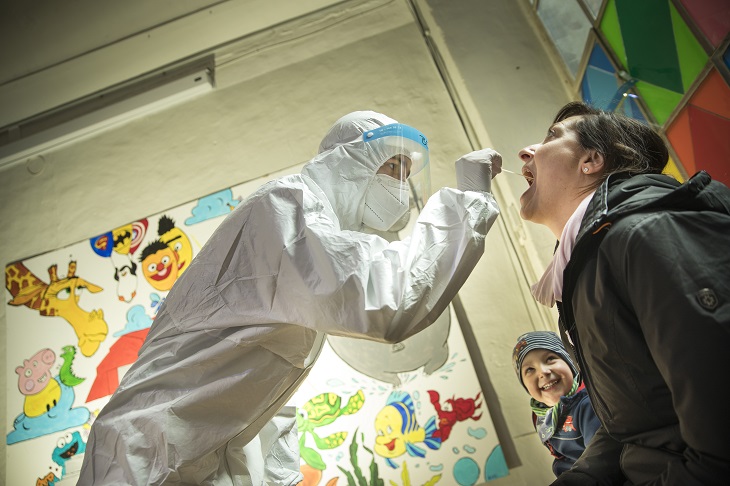Earlier this year in July, one of Australia’s enduring mysteries – the Somerton Man – was solved. It was the story of a man’s body discovered in 1948, lying on a beach in Adelaide. This took place during the hysteria of the Cold War, with the peculiar details of the case sparking decades of elaborate conspiracies involving spies and foreign governments.
The Somerton Man had been poisoned, the name tags were cut out of his clothes except for one that read ‘T Keane’, his suitcase was found abandoned at a local station, and there was a scrap of paper inside his clothes torn from the 12th century Persian text, the Rubáiyát of Omar Khayyám, that read ‘Tamám Shud’ – ‘this is the end’.
Amateurs and professional detectives spent decades on the case, but no one could crack it until Professor Derek Abbott. He took a hair from the Somerton Man’s death mask and submitted it for DNA profiling at the Australian Centre for Ancient DNA at the University of Adelaide. The results were fed into an online family tree software service – where millions of people voluntarily upload their DNA, curious about their ancestry – and 4,000 partial matches popped up.
From there, the detective work was relatively straightforward. Abbott collaborated with forensic genealogist Colleen Fitzpatrick to track down males of a similar age that had no date of death. Carl [known as ‘Charles’] Webb was found. To confirm this was the Somerton Man, they needed a DNA sample from a living relative on the mother’s side. Working down the family tree, they located Stuart Webb and – after convincing the poor bloke that this wasn’t an elaborate scam – he offered up his DNA and results revealed a match.
The Somerton Man is now widely accepted to be Charles Webb, with family albums providing historic photos matching the appearance of the Somerton Man, including his rare genetic features. Police have yet to officially confirm the find, but that is considered by many to be a formality, especially as Charles Webb’s brother-in-law was ‘Thomas Keane’.
Solving the mystery has been a bit of a let down. Charles Webb was not a romantic spy killed over some globe-trekking plot – he was an abusive husband with no friends who liked to write poetry about death. He probably took his own life on the beach and no one reported him missing.
‘I felt so elated that we had found him. It was like being on a treasure hunt,’ said distant relative Stuart Webb.
Indeed, that is what DNA represents to commercial, legal, personal, and law enforcement interests – a treasure trove of biometric data worth untold fortunes.
The construction of giant online biometric family trees for humanity, created through a mixture of law-enforcement harvesting and voluntary curiosity, is an example of ‘Dataism’ in its infancy. Anyone who thought that uploading their DNA to an international database was nothing more than ‘a bit of fun’ to discover their heritage has been conned. I suspect that the government’s sudden enthusiasm for race politics has helped beef-up participation in genetic databases with a slew of young people desperate to attain scientific proof of a distant racially diverse ancestor.
There are forensic, genealogical, medical, and national versions of these DNA databases, with countries increasingly setting up databases in the interest of pursuing criminal activity. In 2020, the UK already had 6.6 million DNA profiles. Criminal offences that require the collection of genetic material include begging, being drunk, and engaging in unlawful protests. In 2006, Tony Blair came out in support of a move to extend the UK’s genetic database to all UK citizens stating that ‘he saw no reason why the DNA of everyone should not ultimately be kept on record’.
Surely having vast DNA networks to track down elusive serial killers is a good thing?
The Golden State Killer, now known as former police officer Joseph James DeAngelo, is rotting behind bars serving 12 life sentences for killing 13 people, raping 51, and 120 burglaries between 1974-1986. DeAngelo’s case became instrumental in California’s DNA database which harvests DNA from accused and convicted felons – similar to systems set up in other states – to solve cold cases. Serious offenders are often caught earlier for minor crimes.
‘He covered his trail very well. What he didn’t account for was DNA technology,’ said Paul Holes, Contra Costa County cold-case investigator.
DeAngelo was captured ‘through the use of genetic genealogy’ after investigators searched GEDmatch – a company founded in 2010 to ‘help amateur and professional researchers and genealogists’ including those who were adopted and wanted to find their undisclosed birth parents. This voluntarily submitted data is often linked to WikiTree – ‘a free, shared global family tree’.
When genetic material is uploaded, matches are given. While the site boasts helping over 10,000 adopted children find their birth parents (already a grey legal area in consent), originally users were unaware that law enforcement agencies would be applying to use the data.
In the DeAngelo case, authorities matched the (then unknown) Golden State Killer’s DNA to his great-great-great-great grandfather in the 1800s. 25 family trees were created out of the accumulated data and from there, 1,000 suspects were collated. In order to confirm DeAngelo was their man, his DNA was ‘surreptitiously collected’ from his car door handle and a tissue – rather than a warrant being issued by a court.
When it became public knowledge that GEDmatch had been used, there was a significant amount of public backlash regarding the unauthorised access of personal biometric data, especially as it became apparent that law enforcement had become addicted to their new research tool. Users must now ‘opt in’ so that those who want to help solve crimes can, while the rest who just want to know who their ancestors are can exclude themselves from nosy authorities.
Like so many ‘it’s for your safety’ initiatives, the public perception of these expansive DNA profile databases has been overwhelmingly positive – and that it understandable for DNA taken from criminal offenders. There is a general perception that those who commit a crime alleviate themselves of certain rights to privacy, including genetic privacy. When it comes to genealogical databases, the information was submitted voluntarily, although the waters did turn murky when law enforcement agencies started dipping into that rich resource of genetic material in order to solve crimes.
Free societies are loosely influenced by the ‘just because you can, doesn’t mean you should’ approach. Yes, we could prevent most crime if we agreed to live in a 24-hour insidious surveillance state with Big Brother leaning over our shoulder, but most citizens would rather put up with low levels of crime than live in a goldfish bowl sitting on the Prime Minister’s desk.
Similarly, the mass collection and access of genetic material of innocent civilians – even in ‘the public interest’ – is a line that we look soon to cross. If you’re still confused as to why this might be a bad idea, China is leading the world by building the largest global DNA database.
Cybersecurity and privacy ‘watchdog’ Comparitech issued a warning that China was involved in the invasive collection of biometric data with serious concerns that American DNA equipment was being sold into Xinjiang for use by police enforcement agencies under suspicion of racial profiling and running ethnic slave camps. As Mind Matters writes, ‘…the [Chinese] government violates the country’s own privacy laws in the name of security and stability.’
China harvests DNA from children and the forced collection of samples from ordinary citizens. The government also took genetic material from prenatal tests from the global community. As described by Reuters:
‘US government advisers warned in March that a vast bank of genomic data that the company, BGI Group, is amassing and analysing with artificial intelligence could give China a path to economic and military advantage. As science pinpoints new links between genes and human traits, access to the biggest, most diverse set of human genomes is a strategic edge. The technology could propel China to dominate global pharmaceuticals, and also potentially lead to genetically enhanced soldiers, or engineered pathogens to target the US population or food supply.’
‘In 2019, I wrote about Chinese authorities collecting DNA samples to teach an algorithm to predict a person’s face based on their genetics. The samples were specifically used to identify members of minority groups. In the past year, several media articles have highlighted the details of the massive surveillance operation that has been going on in Xinjiang. Among those was an article in The Intercept reporting on leaked data from a police database that revealed that the so-called “Physicals for All” program was a front for collecting biometric data from Uyghurs and other minorities.’
While it is correct to be wary of China abusing biometric data, we don’t seem the least bit interested in our Western governments who proved themselves more than capable of abusing power via medical records during the pandemic. It took less than a month for Australian authorities to abuse the QR check-in system – which was outlined specifically and only for the tracing of Covid cases – to solve crimes. The mass stalking experiment on Australians failed in every respect except when it came to revealing how quickly a ‘free’ country gives into police overreach when data is made available. This breach of trust by WA police is only the beginning. SA joined in, stating it intended to hold its QR data indefinitely despite its collection purpose being the immediate detection of Covid cases and therefore having no use a month out from collection. Imagine what kind of liberties the government will take with our data under the Digital Identity project…
In 2019, Beijing ruled that genetic data can be considered an issue of national security and restricted access of foreign researchers to Chinese genetic material. The UK and US made no such ruling, preferring to operate under open sciences policies that allow widespread access to their citizens’ genetic information.
By the time Covid rolled around, the US was more suspicious, taking efforts to make sure that Chinese biotech companies were unable to set up full-service labs to process the genetic material in Covid testing kits that were mandated across vast portions of the population.
April Falcon Doss from the National Security Agency wrote in their book Cyber Privacy: Who Has Your Data And Why You Should Care wrote:
‘Most Americans have probably had their data compromised by the cyber intelligence units of the Chinese government and Chinese military intelligence.’
Retired Army Gen. Keith Alexander added, ‘It gives them tremendous access into who we are.’
China director at Human Rights Watch, Sophie Richardson said, ‘Mass DNA collection by the powerful Chinese police absent effective privacy protections or an independent judicial system is a perfect storm for abuses. China is moving its Orwellian system to the genetic level.’
Her concern is backed up by others who criticise the racial profiling done by the Chinese government in Xinjiang and Tibet which is rumoured to be used to hunt down the relatives of those who escape ethnic camps. Chinese citizens have reported ‘feeling like criminals’ after being forced by authorities into handing over their genetic material, despite having committed no crime.
‘I went to the country policy station to get them to re-issue my ID, and they took my blood and DNA sample … why did they take my DNA? [They said] that’s the rule. If you don’t let us do it, we won’t issue [your ID] … now even f***ing DNA belongs to the Chines Community Party!’
The same is true of DNA profiling. The government is not – and never should be – entitled to peek at our DNA whenever they feel like it.
We are accelerating toward digital authoritarianism with a medical flavour. Governments want to control what we put into our bodies and restrict our travel and access to the economy if we refuse. This instinct, which no decent politician should have, has been bred into the political class via years of international talkfests put on by financially interested parties at the United Nations and World Economic Forum who want to sell our governments the tools of our torture.
Our governments accept this proposition because it allows them to stand up in front of the cameras and shout meaningless nonsense about ‘safety’, ‘security’, and ‘saving the world’.
Politicians are doing none of their things.
They are, however, ushering a China-style system of government underpinned by our DNA. We would be fools to cheer them on because we’re curious about a corpse on a beach or disturbed by the failure of law enforcement to pursue sensible legal routes.
Having all the answers is tempting, but by hell it’ll create a ‘safe’ world that no one wants to live in with our DNA acting as the barbed wire around our safe space…
Got something to add? Join the discussion and comment below.
Get 10 issues for just $10
Subscribe to The Spectator Australia today for the next 10 magazine issues, plus full online access, for just $10.


























Comments
Don't miss out
Join the conversation with other Spectator Australia readers. Subscribe to leave a comment.
SUBSCRIBEAlready a subscriber? Log in